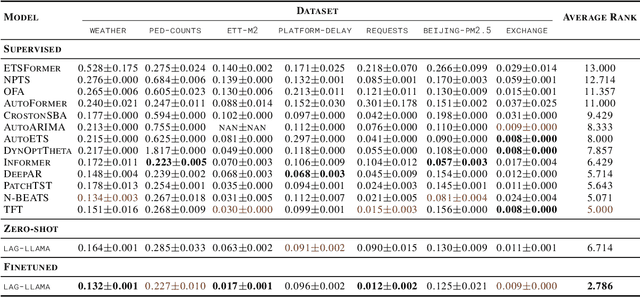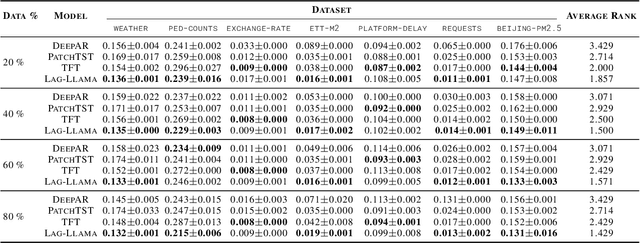Andrew Robert Williams
Beyond Naïve Prompting: Strategies for Improved Zero-shot Context-aided Forecasting with LLMs
Aug 13, 2025Abstract:Forecasting in real-world settings requires models to integrate not only historical data but also relevant contextual information, often available in textual form. While recent work has shown that large language models (LLMs) can be effective context-aided forecasters via na\"ive direct prompting, their full potential remains underexplored. We address this gap with 4 strategies, providing new insights into the zero-shot capabilities of LLMs in this setting. ReDP improves interpretability by eliciting explicit reasoning traces, allowing us to assess the model's reasoning over the context independently from its forecast accuracy. CorDP leverages LLMs solely to refine existing forecasts with context, enhancing their applicability in real-world forecasting pipelines. IC-DP proposes embedding historical examples of context-aided forecasting tasks in the prompt, substantially improving accuracy even for the largest models. Finally, RouteDP optimizes resource efficiency by using LLMs to estimate task difficulty, and routing the most challenging tasks to larger models. Evaluated on different kinds of context-aided forecasting tasks from the CiK benchmark, our strategies demonstrate distinct benefits over na\"ive prompting across LLMs of different sizes and families. These results open the door to further simple yet effective improvements in LLM-based context-aided forecasting.
Context is Key: A Benchmark for Forecasting with Essential Textual Information
Oct 24, 2024



Abstract:Forecasting is a critical task in decision making across various domains. While numerical data provides a foundation, it often lacks crucial context necessary for accurate predictions. Human forecasters frequently rely on additional information, such as background knowledge or constraints, which can be efficiently communicated through natural language. However, the ability of existing forecasting models to effectively integrate this textual information remains an open question. To address this, we introduce "Context is Key" (CiK), a time series forecasting benchmark that pairs numerical data with diverse types of carefully crafted textual context, requiring models to integrate both modalities. We evaluate a range of approaches, including statistical models, time series foundation models, and LLM-based forecasters, and propose a simple yet effective LLM prompting method that outperforms all other tested methods on our benchmark. Our experiments highlight the importance of incorporating contextual information, demonstrate surprising performance when using LLM-based forecasting models, and also reveal some of their critical shortcomings. By presenting this benchmark, we aim to advance multimodal forecasting, promoting models that are both accurate and accessible to decision-makers with varied technical expertise. The benchmark can be visualized at https://servicenow.github.io/context-is-key-forecasting/v0/ .
Lag-Llama: Towards Foundation Models for Time Series Forecasting
Oct 12, 2023



Abstract:Aiming to build foundation models for time-series forecasting and study their scaling behavior, we present here our work-in-progress on Lag-Llama, a general-purpose univariate probabilistic time-series forecasting model trained on a large collection of time-series data. The model shows good zero-shot prediction capabilities on unseen "out-of-distribution" time-series datasets, outperforming supervised baselines. We use smoothly broken power-laws to fit and predict model scaling behavior. The open source code is made available at https://github.com/kashif/pytorch-transformer-ts.
 Add to Chrome
Add to Chrome Add to Firefox
Add to Firefox Add to Edge
Add to Edge